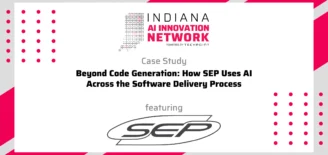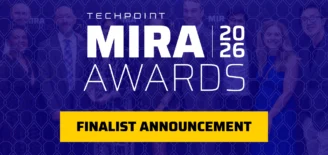Indiana entertainment tech companies are making music more accessible
It’s no secret that almost every facet of life has changed in a major way over the past two years. The music industry, among many others, has been seriously impacted by the pandemic, which greatly influenced the need for tech advancement and virtual access to music.
Entertainment tech has emerged to enhance the way we experience entertainment since before the pandemic, but innovations were desperately needed when everything changed in March 2020. When all in-person events were canceled due to COVID-19, musicians found themselves in a difficult and urgent position; they needed to find ways to provide engaging experiences virtually that would also generate revenue, as well as find opportunities to continue collaborating with other artists, producers, etc.
Despite the change and challenges ahead, many entertainment tech companies chose to innovate instead of stagnating, developing new solutions that could ultimately change the industry and how we consume or create music as a whole.
Changing the game: Mandolin reimagines virtual experiences for artists and at-home audiences
Just two years ago, the idea of a “couch tour” or experiencing “live” music in a meaningful way from your home was a fantasy. While many artists have made past concerts available online or have even live-streamed their shows, many still, understandably, want to attract fans to in-person shows because they know that’s where they can create meaningful engagement with their fans and generate revenue. Artists needed a way to deliver exceptional and attractive experiences to their fans to make up for the fact that they weren’t able to perform in person, which impacted their ability to make a living.
Originally specializing in producing live music shows, Indianapolis-based Mandolin quickly pivoted in 2020 to directly address this challenge by bringing creators and promoters closer to their fans through virtually amplified live music experiences. Self-described as a fan engagement company, Mandolin created a platform to help curate a front-row seat experience for at-home audiences, which includes livestreams, virtual meet and greets, and many more unique features.
Since the pandemic started, Mandolin has grown and thrived. Not only have they been named best streaming platform at the Pollstar Awards, but Mandolin also acquired NoonChorus in September 2021, a platform built for musicians to connect with their fans through live streaming. The acquisition brings in a new layer of music industry expertise and the opportunity to innovate further.
“NoonChorus has built a brilliant team of music industry vets with a congruent set of values around quality and just being good humans,” says Mandolin CEO, Mary Kay Huse. “By bringing their team and network of presenters into the Mandolin family, we’re hoping to accelerate the conversations we’re having across the live entertainment industry—specifically around how the technology can enhance their existing fan engagement strategies.”
Mandolin already offers a variety of special touches to make the at-home experience unique and more intimate. Fans are able to leave messages and song requests in a chat feature, creating a real-time dialogue between artists and the audience. Artists can upsell their experiences with merchandise and other concert upgrades, which entices more people to purchase tickets.
While the focus has been on virtual events over the past years, the add-ons are enhancing the in-person experience as well. Mandolin wants to enhance the in-person experience with an additional virtual touch. For example, a fan could purchase NFTs and show replays as digital mementos, skip the merch line by ordering from the Mandolin app, or attend the meet and greet from your phone or in an Uber.
“The future is hybrid, including a mix of in-person and virtual experiences,” says Huse. “That can mean different things depending on who you ask. Most think of it as simply putting on an in-person show that is also livestreamed. That’s awesome, but our version of hybrid is all about honoring the best parts of live music and doing our part to make them better—more seamless, more flexible, and more direct connection to artists for fans.”
According to Huse, the true value of Mandolin, however, is how the platform helps clients understand the insights they receive from the unique virtual experiences they share with fans. “We’re really differentiating ourselves as a strategic thought partner for artists, venues, festivals, and even brands by offering data-driven recommendations on how to grow and nurture fan bases long term,” says Huse. “We’re focused on giving presenters more access to the data they need to run a better business. Our aim is to give the industry a unified, more comprehensive view of their fans so they can know what their followers want as well as actually act upon those insights.”
Mandolin’s mission is clear: to facilitate more specialized experiences, allowing artists and promoters to go above and beyond a virtual live show with something more personal and meaningful. They are helping to redefine live entertainment as we know it.
Cultivating roots: Soundspace fosters coworking experience for music
Beyond the creator, promoter, and fan experience, the way music is created has continued to change and evolve over the years. With social media and access to a world audience, the ways creators reach their fans are no longer limited to just signing with a label company. Collaboration and access to resources are becoming more and more important. Soundspace is bridging the gap by enabling the coworking experience for music.
“Soundspace connects musical coworking spaces across a shared ecosystem that a musician can access from a single sign-on,” says Kai McGinnis, Co-Founder of Soundspace and the Indy Music Co-Op. “We want to enable the music-making experience for artists and have them as empowered and excited to record their music as they are to perform it. Our product will enable access to and shorten the feedback loop artists experience with studios, ultimately resulting in more music being made at a professional level.”
McGinnis and his team wanted to create a service that would lower the barrier of entry to music-making. “We wanted to allow musicians to be musicians. This is a business model designed for the streaming era. Allowing artists to record their music professionally in a cost-effective manner is important to us and to the future of music. More music gives an opportunity for more listeners to become fans,” says McGinnis.
“We believe that our product will help get would-be artists off the sidelines and into the studios,” says McGinnis. “I think the music industry, from the artists’ perspective, is all about taking control of their own career going forward. In today’s digital landscape, there are dozens of ways to ‘make it’ that look different for each person. We want to empower artists to walk the path they choose by making professional music-making resources more accessible to them.”
In addition to Soundspace, McGinnis co-founded the Indianapolis Music Cooperative (Indy Music Co-Op), a centralized, 24/7 music space for rehearsing, recording, and creating music. In 60 days, the organization was able to raise $300,000 which will be used to build capacity for the Co-Op’s leadership team to tackle launching the facility full-time and cover the construction costs of the initial buildout.
After gathering feedback from hundreds of local arts, Indy Music Co-Op knew that a centralized location for the first beta coworking space was crucial. They ultimately decided on the Circle City Industrial Complex (CCIC), which offers arts and culture, quick access from the main bus line and highway, and a 750-person, all-ages venue that will sit adjacent to the Co-Op.
“We have a ways to go, but this is a fantastic start to building a centralized space for Indianapolis musicians,” says McGinnis. “I’d love to give a huge thank you to the Musical Family Tree for being the fiscal agent on the project and all of the support that helped with our successful crowdfunding campaign. The support has been overwhelming in the best way.”
Soundspace’s mission is to decrease the barriers to music careers. In order to increase access to music resources, they are leveraging their software to get musicians into their own limelight, empowering them to create their own music from studios connected across the country.
The future of the music industry
The future of how we consume, create, and experience music is changing. Mandolin and Soundspace believe creators and fans will have more of a hands-on experience in the future, allowing more individual control and engagement.
“Consider the overnight superstars arising from TikTok or the huge financial gains reaped by the right NFT sales. What Mandolin shares with the technology behind these success stories is that we’re helping creators monetize their creativity and take full control of their destiny,” says Huse.
“We’re seeing artists and venues alike use live streaming as both a marketing tool and a revenue generator of its own, often launching intimate artist sessions to increase album sales, kicking off major tours with a streaming experience that’s available to fans worldwide, or just pocketing some extra ticket revenue,” says Huse. “The experience you build and the ways you engage fans, are totally up to you—and that’s what gets us excited.”
McGinnis also sees the huge potential for streaming as a way to empower artists. “I believe that power is decentralizing away from the ‘black boxes’ and powers that be in the industry. The streaming era is allowing musicians to innovate at a record clip. I believe that the future of how the consumers experience music is going to be much more hands-on and immersive than we’re used to,” says McGinnis.
“Take Kanye’s Donda stem player as an example; it allows fans to mix and remix tracks the artist has released. That’s such a hands-on experience for fans that hasn’t been possible up until recently, and I’m looking forward to seeing how artists continue to innovate within the industry,” says McGinnis.
The impact of these entertainment tech companies has only just been realized, and it benefits everyone. Creators and promoters are able to generate more revenue with less overhead cost, and fans are getting more intimate access and experiences without breaking the bank. Plus, artists are able to go a less traditional route and still get access to a worldwide audience.
While there are certainly more changes on the horizon, it’s clear that live or virtual music experiences aren’t going anywhere. The best part? You can have a front-row seat from anywhere.



